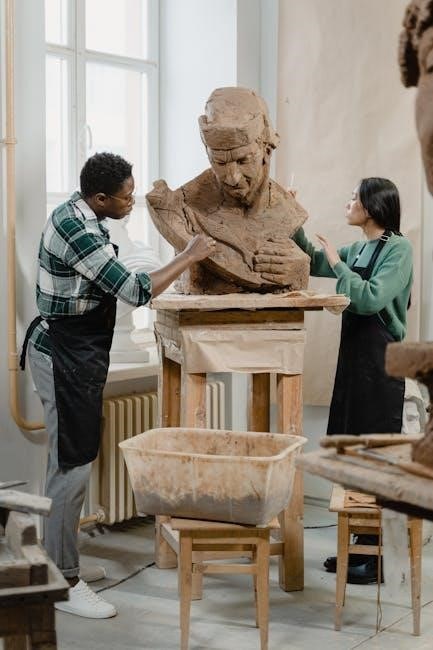Instructional Skills Workshops are engaging, hands-on sessions designed to enhance teaching effectiveness. They focus on practical exercises, interactive learning, and fostering a supportive environment for educators to grow.
What is an Instructional Skills Workshop?
An Instructional Skills Workshop is a short, interactive educational program designed to teach practical skills, techniques, and ideas. These workshops are crafted to provide guided instruction, enabling participants to explore specific topics, solve problems, or create new ideas. They are often born from lectures but evolve into hands-on experiences. The goal is to empower participants with actionable knowledge and tools, fostering innovation and collaboration. Workshops are typically structured to include activities, discussions, and exercises that promote active learning and engagement. They are versatile, catering to diverse needs and serving as a platform for both knowledge transfer and skill development. This approach ensures participants gain tangible outcomes and can apply what they learn in real-world contexts.
Purpose and Benefits of Instructional Skills Workshops
The primary purpose of Instructional Skills Workshops is to equip educators with effective teaching strategies and techniques. These workshops aim to enhance instructional capabilities, promoting deeper learning and student engagement. Benefits include improved teaching confidence, the ability to design engaging lessons, and fostering collaborative learning environments. Participants gain practical skills, such as using direct instruction, formative assessments, and technology integration, to create impactful educational experiences. Workshops also encourage reflection and continuous improvement, helping educators adapt to diverse learning needs. By focusing on real-world applications, these sessions empower teachers to create supportive and inclusive classrooms, ultimately enhancing student outcomes and educational success.

Planning and Structuring the Workshop
Effective workshop planning involves setting clear objectives, organizing content logically, and ensuring engaging activities. Structuring includes balancing instruction with hands-on exercises to maintain participant focus and maximize learning outcomes.
Needs Assessment for Workshop Design
A needs assessment is crucial for designing effective instructional skills workshops. It identifies the specific requirements and skill gaps of participants through surveys, interviews, or feedback. Understanding the audience’s current skill level, teaching challenges, and learning objectives ensures the workshop content is relevant and targeted. This step helps tailor activities and materials to address real needs, enhancing engagement and outcomes. By aligning the workshop with participant expectations and institutional goals, the design becomes purposeful and impactful, fostering a meaningful learning experience. A well-conducted needs assessment lays the foundation for a successful and impactful workshop. It ensures that the content is practical, applicable, and aligned with the participants’ professional development needs.
Curriculum Development for Instructional Skills
Curriculum development for instructional skills workshops involves creating structured, learner-centered content. It focuses on key competencies like lesson planning, classroom management, and effective communication. The curriculum is designed to be interactive and practical, incorporating hands-on activities and real-world applications. By aligning with the needs assessment, the content ensures relevance and applicability. It also integrates technology, such as online tools and resources, to enhance teaching strategies. The curriculum is tailored to cater to diverse learning styles and emphasizes active participation. This approach ensures that educators gain practical skills and confidence to improve their teaching practices. Continuous feedback and assessment are integral to refining the curriculum, making it adaptable to evolving educational needs.
Creating a Workshop Outline
Creating a workshop outline involves organizing content into a structured, logical sequence. It begins with clear objectives and timelines, ensuring each session builds on the previous one. The outline should include an introduction, instructional strategies, hands-on activities, and feedback opportunities; Timing is crucial, with allocated breaks and Q&A sessions. The outline should balance theory with practice, incorporating interactive elements like group discussions and practical exercises. It should also outline assessment methods and provide time for reflection. A well-crafted outline ensures the workshop stays on track, engages participants, and meets its learning goals. Flexibility is key to accommodate participant needs and foster an interactive learning environment.

Delivery Methods for Instructional Skills
Delivery methods for instructional skills workshops combine direct instruction, interactive techniques, and technology integration to engage participants and enhance practical application of teaching strategies effectively.
Direct Instruction Strategies
Direct instruction strategies are structured, teacher-led approaches that emphasize clear presentation of information, demonstration of skills, and guided practice. These methods are highly effective for teaching specific instructional skills, as they allow for focused learning and immediate feedback. In a workshop setting, direct instruction often involves lectures, step-by-step demonstrations, and structured activities that align with learning objectives. This approach ensures participants understand key concepts before applying them in practical exercises. By providing a clear framework, direct instruction helps participants build foundational skills efficiently. It is particularly useful for complex topics, enabling facilitators to break down information into manageable parts and ensure comprehension before moving to more interactive or collaborative tasks.
Interactive and Collaborative Learning Techniques
Interactive and collaborative learning techniques are essential for creating dynamic and engaging Instructional Skills Workshops. These methods encourage active participation, fostering a deeper understanding of instructional strategies. Group discussions, role-playing, and problem-solving activities are common approaches that promote collaboration among participants. By working together, educators can share experiences, brainstorm ideas, and learn from one another. These techniques also allow facilitators to address diverse learning needs and cater to different teaching styles. Interactive activities, such as think-pair-share exercises, enhance critical thinking and communication skills. Collaborative tasks, like small-group projects, help participants apply instructional skills in practical contexts. This approach not only strengthens professional relationships but also reinforces the practical application of workshop content, making learning more meaningful and retention more effective.
Technology Integration in Workshops
Technology integration is a cornerstone of modern Instructional Skills Workshops, enhancing engagement and efficiency. Tools like Google search tips, Control F, and quotation marks for exact searches are often taught to streamline research. These strategies empower educators to navigate digital information efficiently. Workshops also incorporate interactive activities, such as hands-on exercises and online research simulations, to apply these skills in real-time. Technology integration fosters a dynamic learning environment, allowing participants to explore practical applications of instructional techniques. By leveraging technology, workshops bridge the gap between theory and practice, ensuring educators are well-equipped to meet the demands of digital classrooms. This approach not only enriches the learning experience but also prepares participants for future challenges in education.

Assessment and Feedback in Workshops
Workshops employ formative and summative assessments to monitor progress and provide constructive feedback, ensuring participants refine their instructional skills effectively through continuous evaluation and improvement strategies.
Formative Assessment Techniques
Formative assessments in instructional skills workshops involve ongoing evaluations to monitor participants’ progress. Strategies include self-assessment, peer reviews, and instructor feedback, allowing for immediate adjustments to teaching methods. These techniques encourage active participation and help identify areas needing improvement. By fostering a reflective environment, formative assessments empower educators to refine their skills continuously. They also enable facilitators to adapt workshop content dynamically, ensuring relevance and effectiveness. Regular check-ins and collaborative discussions further support this process, making formative assessment a cornerstone of successful instructional skills development. This approach ensures that participants receive timely guidance, enhancing their ability to implement new strategies effectively.
Summative Assessment Methods
Summative assessments in instructional skills workshops evaluate participants’ overall performance at the end of the session. These methods include final presentations, written reflections, and practical demonstrations of acquired skills. They provide a comprehensive understanding of how well participants have mastered the workshop’s objectives. Summative assessments often involve peer evaluations and self-assessments, offering a broader perspective on individual growth. Facilitators use these evaluations to measure the workshop’s effectiveness and identify areas for improvement. The feedback gathered from summative assessments helps in refining future workshop content, ensuring that the learning outcomes align with the participants’ needs. This final evaluation step is crucial for both participants and facilitators to gauge progress and success.
Providing Constructive Feedback to Participants
Providing constructive feedback is essential for fostering growth in instructional skills workshops. Facilitators should deliver feedback that is specific, timely, and actionable, focusing on observed behaviors and their impact. Using a balanced approach, feedback should acknowledge strengths while offering clear suggestions for improvement. Encouraging self-assessment and peer feedback can also deepen participants’ understanding of their skills. Feedback should be framed positively, emphasizing opportunities for development rather than criticism. By creating a safe and supportive environment, facilitators ensure that participants feel encouraged to implement feedback and continue improving. Regular, constructive feedback helps participants refine their instructional strategies and achieve workshop objectives effectively.

Engaging Activities for Instructional Skills Development
Engaging activities include practical exercises, group discussions, and real-world tasks. These interactive approaches encourage active participation, collaboration, and application of skills, enhancing learning outcomes for participants.
Practical Exercises and Hands-On Activities
Practical exercises and hands-on activities are integral to Instructional Skills Workshops, allowing participants to apply skills in real-world contexts. These activities often involve guided instruction, real-world tasks, and problem-solving scenarios. For example, teaching students to use Control F for quick searches or practicing trial-and-error in online research. These exercises make abstract concepts tangible, enabling participants to refine their skills through direct experience. Collaborative tasks and peer discussions further enhance learning, as participants share insights and receive feedback. Such interactive approaches ensure that learners not only understand but also effectively apply the skills, fostering confidence and competence in their instructional abilities. This hands-on focus is a cornerstone of workshop effectiveness, making learning engaging and memorable.
Group Discussions and Collaborative Tasks
Group discussions and collaborative tasks are essential components of Instructional Skills Workshops, fostering active participation and peer-to-peer learning. These activities encourage participants to share perspectives, brainstorm ideas, and solve problems collectively. Collaborative tasks, such as problem-solving scenarios or case studies, promote teamwork and critical thinking. By engaging in discussions, participants gain insights into diverse teaching strategies and practices. Collaborative activities also help build a sense of community, as educators learn from one another’s experiences. This interactive approach enhances retention of skills and concepts, as participants apply what they learn in a supportive and dynamic environment. Such collaborative efforts are key to the workshop’s success in developing instructional expertise.
Real-World Applications of Instructional Skills
Instructional Skills Workshops emphasize real-world applications, enabling educators to apply learned strategies in practical teaching scenarios. Participants explore how to design engaging lessons, manage classrooms effectively, and integrate technology seamlessly. Hands-on activities and case studies allow educators to practice techniques that address diverse learning needs. These workshops also focus on fostering a growth mindset, encouraging participants to adapt strategies to their unique teaching environments. By connecting theoretical concepts to real-world challenges, Instructional Skills Workshops empower educators to enhance student engagement and learning outcomes. The emphasis on practical application ensures that participants leave with actionable tools and strategies to improve their teaching practices immediately.

Creating a Supportive Learning Environment
Foster a growth mindset, encourage active participation, and address diverse learning needs to create an inclusive and engaging atmosphere for effective learning and professional development.
Encouraging Active Participation
Encouraging active participation involves creating an inclusive environment where all learners feel valued and motivated to engage. Techniques such as think-pair-share, group discussions, and hands-on activities foster collaboration and interaction. Using technology like polls or quizzes can also stimulate involvement. Providing clear instructions, positive reinforcement, and opportunities for reflection helps learners stay focused and confident. Encouraging questions and diverse perspectives ensures that everyone contributes meaningfully. By incorporating these strategies, facilitators can create a dynamic and engaging atmosphere that promotes active learning and fosters a sense of community among participants.
Addressing Diverse Learning Needs
Addressing diverse learning needs ensures that all participants can engage effectively, regardless of their background or abilities. Universal Design for Learning (UDL) principles guide facilitators to provide multiple means of engagement, representation, and action. This includes offering materials in various formats, incorporating visual aids, and using assistive technologies. Facilitators can also use formative assessments to identify individual needs and adapt instruction accordingly. Interactive techniques, such as group discussions and hands-on activities, cater to different learning styles. By creating an inclusive environment and using flexible strategies, workshops can meet the unique needs of all participants, fostering a culture of accessibility and equity in learning.
Fostering a Growth Mindset Among Participants
Fostering a growth mindset among participants is crucial for their development. A growth mindset encourages individuals to embrace challenges, view failures as learning opportunities, and persist through difficulties. Facilitators can promote this by emphasizing effort over talent and providing constructive feedback that guides improvement. Encouraging self-reflection and peer discussion helps participants recognize their progress and build confidence. Interactive activities and collaborative tasks further reinforce the idea that learning is a continuous process. By creating a supportive environment, workshops can empower participants to take ownership of their growth, leading to increased resilience and a lifelong commitment to learning and development.

Advanced Instructional Skills and Strategies
Advanced instructional strategies include mastering trial-and-error in online research, using quotation marks for exact searches, and teaching students to utilize Control F for quick information retrieval effectively.
Using Quotation Marks for Exact Searches
Using quotation marks for exact searches is a powerful strategy to refine online research. By enclosing specific phrases or terms in quotes, users can find precise matches, reducing irrelevant results. This technique is particularly useful for locating exact wording, phrases, or titles, ensuring accuracy in research. In instructional skills workshops, teaching this method helps participants efficiently navigate vast amounts of information. It enhances their ability to quickly pinpoint relevant data, saving time and improving the quality of their work. This skill is essential for effective online research, making it a valuable tool for educators and students alike to master in today’s digital landscape.
Teaching Students to Use Control F for Quick Searches
Teaching students to use Control F (or Command F on Mac) is an essential skill for efficient online research. This shortcut allows users to quickly locate specific keywords or phrases within a webpage, saving time and reducing frustration. In instructional skills workshops, educators can demonstrate how to activate the search function and navigate through results. This tool is particularly useful for lengthy documents or articles, enabling students to focus on relevant sections. By mastering this technique, learners can enhance their research efficiency and effectiveness, making it a valuable addition to their digital literacy toolkit. This practical skill empowers students to work smarter, not harder, in their academic pursuits.
Mastering Trial-and-Error in Online Research
Mastering trial-and-error in online research is a crucial skill for effective learning. It involves experimenting with different search terms, strategies, and techniques to find relevant information. In instructional skills workshops, educators emphasize the importance of persistence and adaptability when navigating online resources. Students learn to refine their searches by adjusting keywords, using advanced search filters, and evaluating results critically. This iterative process helps build resilience and improves problem-solving abilities. By embracing trial-and-error, participants develop a growth mindset, understanding that setbacks are opportunities to refine their approach. This skill is essential in today’s information-rich world, enabling learners to efficiently locate credible sources and achieve their academic goals.

Workshop Facilitation and Leadership
Effective facilitation involves guiding participants with clear communication, managing time efficiently, and fostering engagement. Leaders create a structured yet flexible environment, addressing challenges with adaptability and expertise.
Effective Communication Skills for Facilitators
Effective communication is crucial for facilitators to engage participants and convey ideas clearly. This involves active listening, articulating instructions precisely, and encouraging open dialogue. Facilitators should adapt their communication style to meet diverse learning needs, ensuring all voices are heard. Clear and concise language helps avoid confusion, while non-verbal cues like eye contact and gestures enhance connection. Regular check-ins and feedback loops ensure participants stay on track. By fostering a supportive and inclusive environment, facilitators can maximize learning outcomes and promote collaboration. Strong communication skills are foundational to leading successful workshops and ensuring participants feel valued and empowered.
Managing Time and Staying on Schedule
Effective time management is essential for ensuring workshops remain productive and on track. Facilitators should create a detailed schedule with clear time allocations for each activity. Starting and ending sessions punctually sets a professional tone and respects participants’ time. Prioritizing key topics and allowing flexibility for engaging discussions helps maintain focus without rushing. Regular time checks and transitions between activities keep the workshop flowing smoothly. Participants appreciate a well-organized structure, which enhances their learning experience. By managing time efficiently, facilitators can cover all objectives while fostering an environment conducive to active participation and meaningful engagement.
Handling Challenging Situations in Workshops
Handling challenging situations in workshops requires facilitators to remain calm, flexible, and proactive. Active listening and addressing concerns promptly can de-escalate tensions. Redirecting conversations to align with workshop goals ensures focus. Encouraging open dialogue and mutual respect fosters a positive environment. Staying prepared with backup plans and alternative activities helps manage unexpected disruptions. Facilitators should also be adept at mediating conflicts and balancing diverse participant needs. By maintaining a solution-oriented mindset, they can turn challenges into opportunities for growth. Effective communication and empathy are key to resolving issues while keeping the workshop productive and engaging for all participants. This approach ensures learning objectives remain achievable despite challenges.

Evaluating Workshop Effectiveness
Evaluating workshop effectiveness involves assessing learning outcomes and gathering participant feedback. Formative assessments and satisfaction surveys help measure success and identify areas for improvement in instructional skills development.
Participant Feedback and Satisfaction Surveys
Participant feedback and satisfaction surveys are crucial for evaluating workshop effectiveness. These tools allow instructors to gather insights on the relevance and impact of the content. Surveys typically include questions about the clarity of instructions, engagement levels, and overall satisfaction with the workshop. Feedback is often collected through anonymous surveys, focus groups, or one-on-one interviews. This data helps identify strengths and areas for improvement, ensuring continuous enhancement of instructional skills. By analyzing participant responses, facilitators can refine their teaching strategies and curriculum design. Feedback also provides participants with a voice, empowering them to shape future learning experiences. This collaborative approach fosters a commitment to ongoing professional development and improved educational outcomes.
Measuring Learning Outcomes
Measuring learning outcomes in instructional skills workshops ensures participants achieve the intended skills and knowledge. This involves assessing understanding through quizzes, practical tasks, and reflective exercises. Facilitators use formative assessments to monitor progress during the workshop, while summative assessments evaluate final mastery. Observing participants during hands-on activities and reviewing their work provides insight into skill acquisition. Feedback from these assessments helps identify areas where participants excel or need improvement. By aligning assessments with workshop goals, facilitators can determine the effectiveness of the training. Measuring outcomes also highlights the practical application of skills, ensuring participants can apply what they’ve learned in real-world scenarios. This data-driven approach supports continuous improvement and enhances the overall quality of the workshop experience.

Continuous Improvement Strategies
Continuous improvement strategies are essential for refining instructional skills workshops. These strategies involve regularly collecting participant feedback to identify strengths and areas for enhancement. By analyzing feedback and assessment data, facilitators can refine workshop content, adjust delivery methods, and incorporate new tools or techniques. Reflecting on participant learning outcomes helps determine the effectiveness of the curriculum and activities. Additionally, staying updated on educational trends and technologies ensures workshops remain relevant and impactful. Continuous improvement fosters a growth mindset among facilitators, encouraging them to innovate and adapt their approaches. This iterative process ensures workshops consistently meet the evolving needs of participants and align with broader educational goals.
Instructional Skills Workshops empower educators with practical tools and strategies to enhance teaching effectiveness. The next steps involve applying these skills, seeking feedback, and exploring advanced techniques for continuous growth.
Recap of Key Takeaways
Instructional Skills Workshops equip educators with evidence-based strategies to enhance teaching effectiveness; Key takeaways include the importance of interactive learning, formative assessments, and direct instruction; Participants learn to design engaging curricula, integrate technology, and foster collaborative environments. Practical exercises and real-world applications help refine instructional techniques. The workshops emphasize creating a supportive setting that encourages active participation and addresses diverse learning needs. By mastering these skills, educators can improve student outcomes and foster a growth mindset. Continuous feedback and self-assessment are highlighted as crucial for ongoing professional development. These workshops provide a foundation for educators to adapt and evolve in their teaching practices, ensuring impactful and meaningful learning experiences for students.
Resources for Further Learning
For further development, educators can explore resources like eBooks on online research skills, posters detailing effective search strategies, and online courses on instructional techniques. Websites offering practical guides to direct instruction and formative assessments are invaluable. Platforms like Coursera and LinkedIn Learning provide courses on advanced instructional strategies. Additionally, tools like Kahoot and Padlet can enhance workshop engagement. The Poorvu Center for Teaching and Learning offers insights on assessments, while Emily Carr University shares innovative approaches to instructional design. These resources empower educators to refine their skills, integrate technology, and create dynamic learning environments, supporting continuous professional growth and effective teaching practices.
Encouraging Ongoing Professional Development
Instructional Skills Workshops emphasize the importance of continuous growth for educators. Participants are encouraged to explore resources like eBooks, online courses, and practical guides to refine their teaching strategies. Engaging with communities of practice and peer-support networks fosters collaboration and shared learning. Staying updated with educational trends and technologies, such as tools like Kahoot and Padlet, enhances workshop effectiveness. Institutions like the Poorvu Center for Teaching and Learning and Emily Carr University offer innovative approaches to instructional design. By prioritizing ongoing development, educators can adapt to evolving educational needs, ensuring they remain effective and inspiring in their roles, ultimately benefiting both themselves and their students.